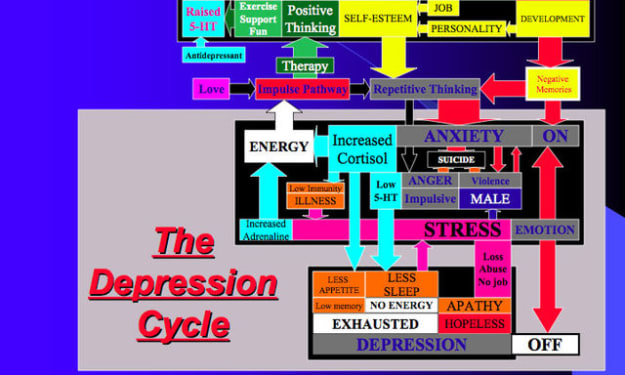In which age groups are depression, anxiety, and stress more generally found?
Feeling the Weight? Awareness Age and the Wild Ride of Feelings
We all experience involvement, push, uneasiness, and misery at some point in our lives. These feelings are an ordinary portion of human involvement, making a difference as we explore challenges and perils. But now and then, these sentiments can end up overpowering and tireless, affecting our day by day lives. The address at that point emerges are a few age groups more helpless in these enthusiastic battles?
The truth is, misery, uneasiness, and push can influence individuals of all ages. In any case, inquire about the possibility that these conditions may show up in an unexpected way and happen more regularly in certain life stages. Let's dive deeper and investigate the enthusiastic scene among diverse age groups:
Childhood and Puberty (Ages 6–18):
Typically, this is a pivotal period of improvement, stamped by fast physical and passionate changes. Children and youngsters hook up with self discover, scholarly weights, peer connections, and family flow. These variables can contribute to uneasiness and discouragement. Also, social media can compound sentiments of insufficiency and separation.
Youthful Adulthood (Ages 19–30):
Typically, this is a time of critical moves propelling careers, setting up freedom, and exploring sentimental connections. These vulnerabilities can be breeding grounds for push and uneasiness. Budgetary stresses, scholastic obligations, and the weight of success can also weigh intensely.
Center Adulthood (Ages 31–50):
Juggling work, family obligations, and maturing guardians can make a culminating storm for a push into adulthood. Adjusting career requests, childcare, and individual well-being can feel overpowering. Furthermore, this age group might face health concerns and existential tensions around the end of the.
Late Adulthood (Ages 50+):
Retirement, physical confinement, and the potential misfortunes of cherished ones can be challenging for more seasoned adults. Social confinement and sentiments of loneliness can also contribute to sadness and uneasiness. In any case, this age group too illustrates exceptional versatility, regularly finding modern meaning and reason in afterward life.
It's important to remember:
These are fairly common patterns. There's a wide range of encounters within each age group. A few people may well be. more strong to push than others due to hereditary inclination, adapting instruments, and social back frames.
Noticing the offer of assistance could be a sign of quality:
Regardless of age, it's important to recognize the signs of sadness, uneasiness, and push. These can incorporate diligent sentiments of pity, sadness, stress, crabbiness, trouble concentrating, changes in rest or craving, and withdrawal from social exercises. In the event that you're battling, do not falter to look for and offer assistance! Talking to an advisor, counselor, or specialist can give you important bolster and direction.
Early mediation is key:
Tending to these conditions early can prevent them from declining and affecting long-term well-being. Treatment choices incorporate treatment, pharmaceuticals, and way of life changes like healthy eating, regular workouts, and unwinding methods.
Let's Break the Disgrace:
Mental wellbeing battles shouldn't be a source of disgrace. By straightforwardly talking about these issues and looking for assistance, we will create a more steady environment for individuals of all ages. Remember, you're not alone, and there's trust for a brighter and more adjusted, passionate state.
Taking Care of Yourself at Each Age: All through life, prioritizing self care is basic. Here are a few tips to oversee stretch, uneasiness, and sadness:
Interface with others: Construct and maintain strong social associations with family and companions.
Remain Active: A customary workout may be a capable temperament booster.
Hone Unwinding Procedures: Investigate strategies like yoga, profound breathing, or contemplation to oversee the push.
Keep up a solid rest plan: Point for 7 to 8 hours of quality rest each night.
Eat an adjusted count of calories: Feed your body with nutritious nourishment to bolster your passionate well-being.
Restrain liquor and drugs: These substances can compound mental health issues.
Look for Proficient Offer Assistance: Do not falter in reaching out to an advisor or specialist on the off chance that you're battling.
By understanding the passionate scene over distinctive age groups and prioritizing self care, we are all able to explore the inescapable ups and downs of life with more noteworthy flexibility and passionate well-being. Remember, you're not characterized by your battles, and there's continuous trust for a brighter, more passionate future.
About the Creator
Sam Avery
The best content material in the international won’t force sales if no person sees. Good content isn't about precise storytelling. It’s about telling a true tale nicely.
Enjoyed the story? Support the Creator.
Subscribe for free to receive all their stories in your feed. You could also pledge your support or give them a one-off tip, letting them know you appreciate their work.







Comments
There are no comments for this story
Be the first to respond and start the conversation.